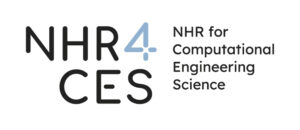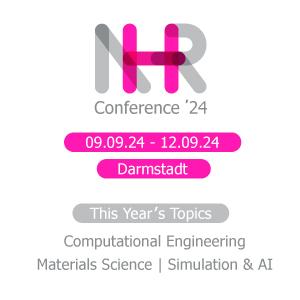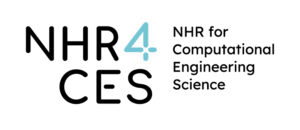Schlagwort: ‘HPC’
Parallel Computing with MATLAB on the CLAIX Cluster
We are excited to announce the continuation of the successful collaboration between HPC.NRW and MathWorks for the third consecutive year, offering a comprehensive series of four workshops designed to empower researchers, engineers, and scientists. This unique series aims to enhance skills in high-performance computing (HPC), software development for research, and artificial intelligence (AI) with MATLAB.
The second part of the Parallel Computing with MATLAB series focuses on walking users through accessing the cluster, setting up a cluster profile, and submitting sample jobs. FastX is used to launch MATLAB interactively, where users are shown how to set job submission arguments before running both single node and multi node jobs. Users will follow along and submit various CPU-only jobs before discussion moves to using GPUs. Additionally, users will learn how to debug and troubleshoot if any errors appear.
Workshop Series
- Parallel Computing with MATLAB
- Parallel Computing with MATLAB on the CLAIX Cluster (this course)
- Introduction to Research Software Development with MATLAB
- AI for Predictive Maintenance
Organization
- There is no seminar fee.
- Presentations will be given in English. Slides will be available after the event.
- This is an online event and will be held in Zoom. Links are sent to registered attendees with the registration confirmation.
- You can/must register per topic, i.e., for each workshop separately.
Speaker
- Damian Pietrus (MathWorks)
Course level
- Intermediate
Target audience
- MATLAB users interested in scaling to HPC
- Existing HPC users of the interested in parallel MATLAB
Prerequisites
-
- Basic MATLAB familiarity
- Existing Account on the CLAIX cluster of RWTH Aachen University
- MATLAB Client and Parallel Toolbox installed on your local Workstation/Laptop
- Network Access to CLAIX (Networks external to RWTH Aachen University may need VPN Access)
Gained skills
- How to configure MATLAB to submit jobs to the CLAIX cluster
- The MATLAB job submission workflow
- Job optimization and tuning
- Using GPUs with MATLAB
- Troubleshooting job submission techniques
- Best practices for rehosting code onto the cluster
Registration
Cooperation Partners
 |
 |
NHR4CES – Introduction to eXtended Discontinuous Galerkin Methods for Multi-Phase Flow Problems
 Name: Introduction to eXtended Discontinuous Galerkin Methods for Multi-Phase Flow Problems
Name: Introduction to eXtended Discontinuous Galerkin Methods for Multi-Phase Flow Problems
Date: 14.05.2024 1.00 pm – 5.00 pm
Format: online
Description
Short abstract:
NHR4CES – Introduction to Turbulence Modeling and Numerical Implementation
 Name: Introduction to Turbulence Modeling and Numerical Implementation
Name: Introduction to Turbulence Modeling and Numerical Implementation
Date: 07.05.2024, 1.00 pm – 5.00 pm
Format: online
Description
Short abstract:
NHR4CES – Efficient HPC implementation for Lagrangian particle tracking
 Name: Efficient HPC implementation for Lagrangian particle tracking
Name: Efficient HPC implementation for Lagrangian particle tracking
Date: 30.04.2024 1.00 pm – 5.00 pm;
Format: hybrid
Description
NHR4CES – Introduction to Finite Element Methods for Flow Problems
 Name: Introduction to Finite Element Methods for Flow Problems
Name: Introduction to Finite Element Methods for Flow Problems
Date: 23.04.2024 01.00 pm – 05.00 pm
Format: Online
Description
Short abstract:
NHR4CES – Machine Learning for Materials Science
 Name: Machine Learning for Materials Science
Name: Machine Learning for Materials Science
Date: Date: October 21 – 23, 2024, 9.00 am – 01.00 pm
Format: Online
Description
Short abstract:
Data Science and Machine Learning are seen as the “Forth Paradigm” in Materials Science and are reshaping the research direction in many areas. In this training, the students/participants will gain an overview and obtain hand-on experience on the most relevant machine learning algorithms for theoretical simulations, experimental characterization, and in general statistical analysis in materials science. The participants will work with established packages within Python to develop their own simple machine learning based programs, and are going to tackle a challenging project. Though exemplary datasets, the participants will practice to apply appropriate methods to basic materials science problems, in particular Machine Learning assisted image segmentation, Machine-learning interatomic potentials, microstructure-property correlation analysis, and data-driven multiscale modeling.
Parallel Computing with MATLAB
We are excited to announce the continuation of the successful collaboration between HPC.NRW and MathWorks for the third consecutive year, offering a comprehensive series of four workshops designed to empower researchers, engineers, and scientists. This unique series aims to enhance skills in high-performance computing (HPC), software development for research, and artificial intelligence (AI) with MATLAB.
The first part of the Parallel Computing workshops focuses on parallel computing with MATLAB on the desktop. The host introduces the concept of parallel computing and briefly covers optimizing code before diving into parallelism in MATLAB and common programming constructs such as parfor (including optimization and performance considerations), parfeval, and parsim. Next, scaling options are introduced with discussion about GPUs and clusters/clouds and the workflow of submitting to these resources. Throughout this part of the workshop, users will complete hands-on exercises alongside the instructor as concepts are introduced in a special MATLAB Online classroom.
Workshop Series
- Parallel Computing with MATLAB (this course)
- Parallel Computing with MATLAB on the CLAIX Cluster
- Introduction to Research Software Development with MATLAB
- AI for Predictive Maintenance
Organization
- There is no seminar fee.
- Presentations will be given in English. Slides will be available after the event.
- This is an online event and will be held in Zoom. Links are sent to registered attendees with the registration confirmation.
- You can/must register per topic, i.e., for each workshop separately.
Speaker
- Dr. Thomas Künzel (MathWorks)
Course level
- Beginner to intermediate
Target audience
- Students, researchers and scientists with increasing computational demands
Prerequisites
- Basic MATLAB familiarity
- Your MathWorks-Account
Gained skills
- Understanding of the philosophy of MATLABs parallel computing language
- Apply MATLABs high-level parallel computing language constructs
- Knowledge of how to use NVIDIA GPUs for computation in MATLAB
- Running synchronous and asynchronous parallel computations with MATLAB
- Solving Big-Data problems with MATLAB
Registration
Cooperation Partners
 |
 |
NHR Conference 2024
Name: NHR Conference 2024
Date: 09.09.24 – 12.09.24
Place: Darmstadt
Description
The annual NHR-Conference is aiming at promoting scientific exchange among the HPC-user community. Each year the focus will be on different scientific topics.
The NHR Conference ’24 will take place in Darmstadt. During the Scientific Part users of the NHR Centers will have the opportunity to present their projects in a contributed talk or poster session, and to exchange ideas with the consulting and operational teams of the NHR-Centers.

This year’s topics:
- Computational Engineering
- Materials Science
- Simulation & Artificial Intelligence
VI-HPS Porting and Tuning Workshop 2024
Location: IT Center RWTH Aachen & ZIH, TU Dresden
Klick here for Registration and further information.
Description
This workshop is organized by VI-HPS and the NHR centers NHR4CES@RWTH (IT Center, RWTH Aachen University) and NHR@TUD (ZIH, TU Dresden) and focuses on the new computing platforms „CLAIX-2023“ and „Barnard“ at RWTH Aachen and TU Dresden, respectively.
The workshop will be co-scheduled with the workshop of the same name at NHR@TUD in Dresden. Presentations will be streamed to the corresponding other location depending on the location of the speaker.
Tool experts for the hands-on tuning part will be on-site at both locations. Note that no hands-on tuning assistance can be given to online-only participants. For on-site hands-on participants you will have to bring a self-written application code written in C/C++/Fortran/Python that is parallelized with common HPC programming Paradigms, such as OpenMP, MPI, and/or C++ and POSIX threads.
On completion participants should be familiar with the module system and SLURM configuration and monitoring systems on CLAIX-2023 and Bernard (depending on selected site), common performance analysis and diagnosis techniques and how they can be employed in practice (on a range of HPC systems). Those who prepared their own application test cases will have been coached in the tuning of their measurement and analysis, and provided optimization suggestions.
Target Audience:
Monday (Porting day): Any current and future user who is interested in building and/or running software on the prospective HPC system of RWTH Aachen University, CLAIX-2023.
Tuesday–Friday (Tuning days): Any developer of C/C++/Fortran HPC software using OpenMP, Pthreads, C++ threads, and/or MPI, who is interested in identifying performance bottlenecks within the HPC application.
Gained skills:
Monday (Porting day):
– Basic knowledge about the Hardware of CLAIX-2023
– Using the software stack and module system of CLAIX-2023
– Best practices for building software on CLAIX-2023
– Writing SLRUM job submission scripts for CLAIX-2023
– Using the job monitoring system of CLAIX-2023 to verify expected performance parameters of an application run
Tuesday–Friday (Tuning days):
– Identifying performance problems of your application on the node-level using MAQAO and LIKWID
– Gaining an runtime summary of an application using Score-P and TAU
– Using advance performance explorers to navigate the measurement results
– Tuning the Score-P measurement configurations for your application
– Obtaining event trace information for your application using Score-P
– Using Scalasca to automatically search for inefficient application behavior
– Using Vampir for in-depth understanding of process and thread interaction
– Using lo2s to understand execution behavior of an application and OS influence on it
Prerequisites:
Monday (Porting day):
– Knowledge on how to access the current CLAIX-2018 system
– Basic knowledge about the SLURM job scheduling system (join Introduction to HPC for those basic skills)
Tuesday (Tuning days):
– An HPC code written in C/C++/Fortran using OpenMP/Pthreads/C++-threads and/or MPI
– Active developer with in-depth understanding of the provided code
– General understanding of building software on an HPC platform
Note that registration for this workshop for online or on-site participation at either location is handled via the registration page at TU Dresden. It is possible to register for individual days.
Please contact us for any further questions.
Agenda
The workshop has two parts with individual focus: The first part focuses on porting your application to the respective local platform at RWTH Aachen and TU Dresden. It will give an overview of the Sapphire Rapids architecture and node configuration, the local environments and monitoring solutions, and how to use the systems effectively. Presentations will take place on the first day, assistance will be given on-site and online on Monday, and online-only for the remainder of the week.
The second part (starting on Tuesday) focuses on tuning your application on the systems with the use of several tools of the VI-HPS programming tools suite. It will give an overview of the selected tools, explain their functionality, and how to use them effectively. Furthermore, it will offer hands-on experience and expert assistance using the tools on participants‘ own codes.
Introduction to the HPC JupyterHub at the RWTH
Abstract
The HPC JupyterHub service at the RWTH allows all eligible users of the RWTH Compute Cluster to utilize the existing compute hardware interactively with the use of Jupyter Notebooks. This HPC JupyterHub provides customization of Profiles with a variety of programming kernels, software packages, and hardware definitions. This workshop will showcase the HPC JupyterHub service.
Target Audience
New HPC JupyterHub users: HPC, Simulation Software and Machine Learning users.
Requirements
HPC and VPN account at the RWTH for the interactive demo.





